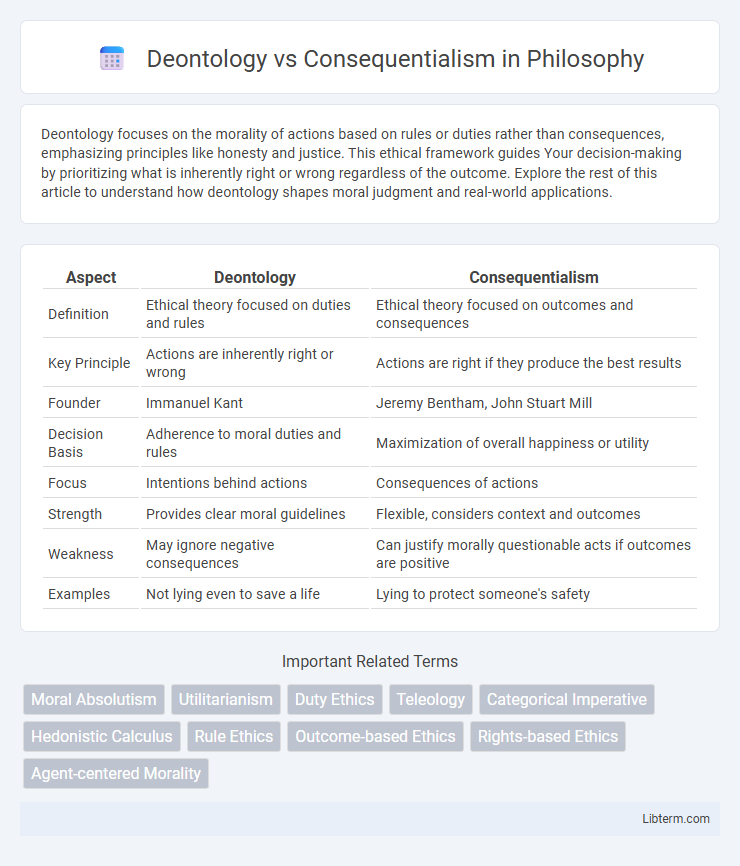Deontology focuses on the morality of actions based on rules or duties rather than consequences, emphasizing principles like honesty and justice. This ethical framework guides Your decision-making by prioritizing what is inherently right or wrong regardless of the outcome. Explore the rest of this article to understand how deontology shapes moral judgment and real-world applications.
Table of Comparison
| Aspect | Deontology | Consequentialism |
|---|---|---|
| Definition | Ethical theory focused on duties and rules | Ethical theory focused on outcomes and consequences |
| Key Principle | Actions are inherently right or wrong | Actions are right if they produce the best results |
| Founder | Immanuel Kant | Jeremy Bentham, John Stuart Mill |
| Decision Basis | Adherence to moral duties and rules | Maximization of overall happiness or utility |
| Focus | Intentions behind actions | Consequences of actions |
| Strength | Provides clear moral guidelines | Flexible, considers context and outcomes |
| Weakness | May ignore negative consequences | Can justify morally questionable acts if outcomes are positive |
| Examples | Not lying even to save a life | Lying to protect someone's safety |
Introduction to Ethical Theories
Deontology emphasizes adherence to moral rules and duties as the foundation of ethical behavior, valuing actions based on their intrinsic rightness regardless of outcomes. Consequentialism evaluates the morality of actions exclusively by their outcomes, prioritizing the greatest good or utility achieved. These ethical theories provide contrasting frameworks for decision-making, shaping diverse perspectives in moral philosophy and applied ethics.
Defining Deontology
Deontology is an ethical theory that emphasizes adherence to moral duties, rules, and principles regardless of outcomes. It asserts that certain actions are inherently right or wrong based on their intrinsic nature, independent of consequences. Immanuel Kant's categorical imperative is a foundational concept in deontology, guiding individuals to act according to maxims that can be universally applied.
Understanding Consequentialism
Consequentialism evaluates the morality of actions based on their outcomes, prioritizing the greatest good or overall happiness produced by those actions. Central to this ethical theory is the principle that the rightness or wrongness of decisions depends solely on their consequences, often measured through utilitarian calculations. This approach contrasts with deontology, which emphasizes adherence to moral duties regardless of results.
Historical Origins and Key Philosophers
Deontology traces its roots to Immanuel Kant's 18th-century philosophy, emphasizing duty, moral rules, and the categorical imperative as central to ethical behavior. Consequentialism, particularly utilitarianism, originated with Jeremy Bentham and John Stuart Mill in the 18th and 19th centuries, prioritizing outcomes and the greatest happiness principle as measures of morality. These foundational philosophers established distinct approaches: Kant's deontology focuses on intentions and universal duties, while Bentham and Mill's consequentialism evaluates the ethical value based on results and overall utility.
Core Principles: Duty vs. Outcomes
Deontology centers on the principle that actions are morally right based on adherence to rules or duties, regardless of consequences. Consequentialism evaluates the morality of actions by their outcomes, emphasizing the greatest good or utility achieved. The core distinction lies in deontology prioritizing duty-bound ethics, while consequentialism prioritizes result-oriented ethics.
Case Studies: Applying Deontology and Consequentialism
Case studies applying deontology emphasize adherence to moral duties, such as honesty in patient confidentiality, regardless of outcomes, highlighting principles like Kant's categorical imperative. Consequentialist case studies evaluate decisions based on outcomes, such as utilitarian cost-benefit analyses in public health policies aiming to maximize overall well-being. Comparing both frameworks in real-world scenarios illustrates tensions between rule-based ethics and outcome-driven ethics in fields like medical ethics, law, and business decision-making.
Strengths and Weaknesses of Deontology
Deontology's strength lies in its clear commitment to moral duties and principles, ensuring consistency and respect for individuals' rights regardless of outcomes. Its rigid adherence to rules can simplify ethical decision-making but may lead to conflicts when duties clash or ignore consequential realities. Critics highlight its inflexibility and potential to produce morally questionable results by prioritizing rules over the consequences of actions.
Strengths and Weaknesses of Consequentialism
Consequentialism emphasizes outcomes, making moral decisions based on the results that maximize overall good, which provides a practical framework for ethics in policy-making and utilitarian calculations. Its strength lies in flexibility and adaptability to different situations, allowing for context-sensitive judgments that prioritize well-being and happiness. However, consequentialism faces criticism for potentially justifying morally questionable actions if they yield favorable outcomes, and it often struggles with measuring and predicting consequences accurately.
Contemporary Debates and Hybrid Approaches
Contemporary debates in ethics highlight tensions between deontology's rule-based morality and consequentialism's outcome-focused evaluation, with philosophers exploring contexts where rigid adherence to duties may conflict with maximizing overall well-being. Hybrid approaches like rule utilitarianism and threshold deontology attempt to reconcile these perspectives by allowing duty-based rules to guide behavior except in extreme scenarios demanding consequentialist assessment. Empirical studies in moral psychology also inform these debates, showing how human decision-making often integrates deontological intuitions with consequentialist reasoning in complex ethical dilemmas.
Conclusion: Navigating Ethical Dilemmas
Deontology emphasizes adherence to moral duties and rules, ensuring actions align with inherent ethical principles regardless of outcomes. Consequentialism prioritizes the results of actions, striving to maximize overall good or minimize harm in decision-making processes. Navigating ethical dilemmas requires balancing rule-based duties with outcome-focused considerations to achieve morally sound and contextually appropriate resolutions.
Deontology Infographic

 libterm.com
libterm.com